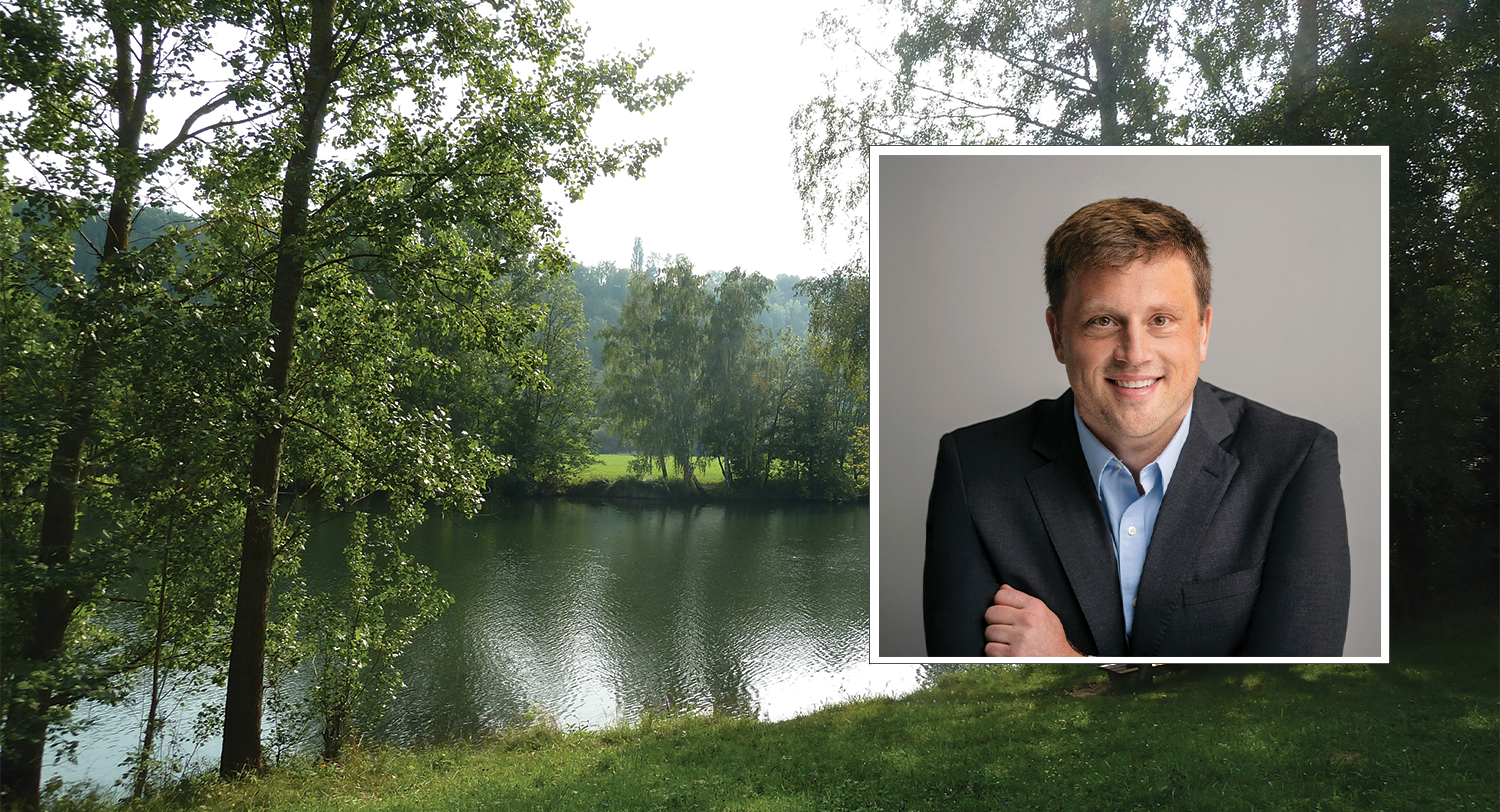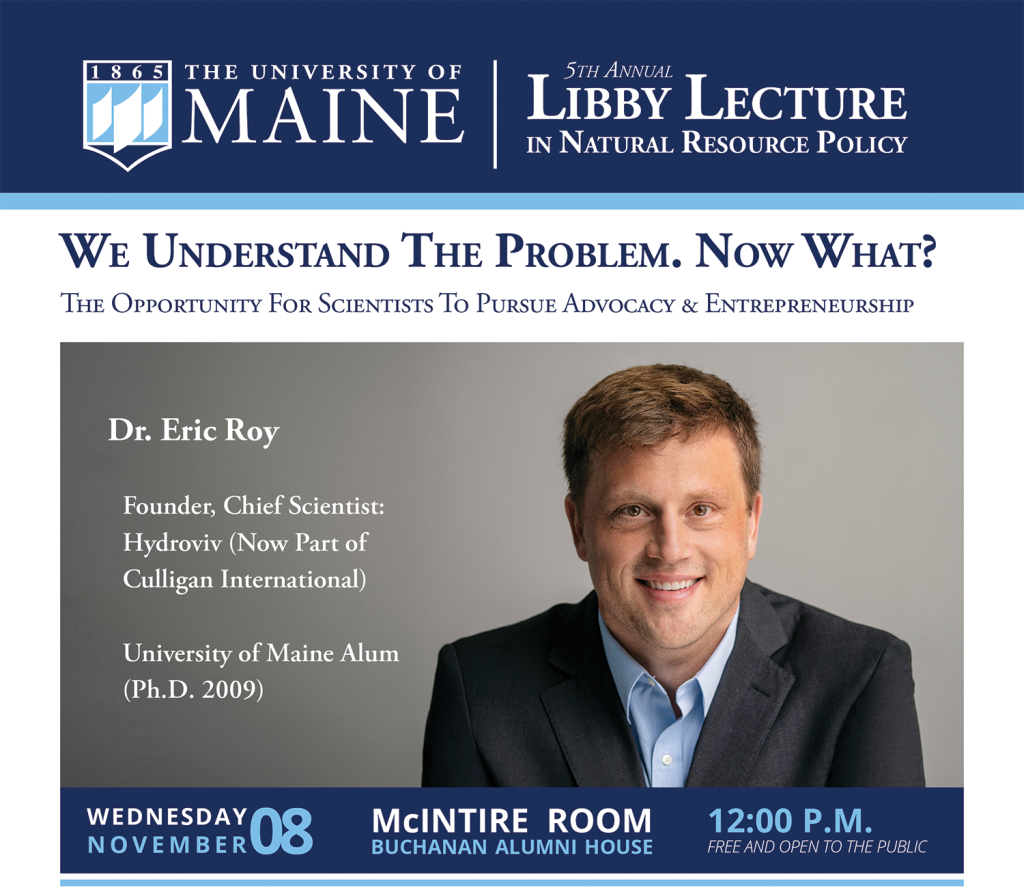
2023 Libby Lecture: We Understand the Problem. Now What? The Opportunity for Scientists to Pursue Advocacy & Entrepreneurship

Dr. Eric Roy will present the University of Maine’s fifth annual Libby Lecture in Natural Resource Policy at noon on November 8 at the Buchanan Alumni House.
Roy’s talk, titled “We Understand the Problem. Now What? The Opportunity for Scientists to Pursue Advocacy & Entrepreneurship” will discuss why scientists are uniquely positioned to lead advocacy efforts and develop entrepreneurial solutions to the “big problems” that face our world and discuss examples of the types of unique challenges, opportunities, and lessons learned that accompany these types of public-forward pursuits.
Dr. Roy is the founder of Hydroviv, a water filtration company that will analyze a customer’s specific needs and tailor custom filters to them. Roy built the company from a nights-and-weekends side gig, crafting filters in his apartment and selling them at farmers’ markets and other DIY locations, to a significant ecommerce success. He appeared on the ABC show “Shark Tank” and ultimately sold the company to global water innovation company Culligan, though he remains in the role of chief scientist. Roy received his PhD from the University of Maine in 2009.
In a brief Q&A, Dr. Roy shared thoughts on what drew him to the water filtration space, the overlap between advocacy and entrepreneurship, and what it means to share his experiences with his alma mater.
(The following has been lightly edited for length and clarity.)
–
What first drew you to the water filtration space?
I’ve been doing research on aquatic chemistry in some way for the better part of 20 years, going back to my undergraduate research in 2002. Water filtration is a more applied slant on the types of research I did at Colby College, UMaine, and at Orono Spectral Solutions. The idea that you could incorporate technology into a device that a massive number of people could use every day in their home was something that was exciting and felt impactful.
How would you describe the process of building Hydroviv?
It felt a lot like someone who is carrying too many boxes and is always in a state of dropping or picking them up. This was in part because I had never worked in ecommerce, but mostly because Hydroviv was a nights and weekends side project for me (I kept a demanding full-time job for the majority of Hydroviv’s existence to pay the bills & fund the company). Almost all of the commercial aspects of the business were things I had never dealt with before – ecommerce, digital marketing, consumer products, etc. Honestly, the only area where I really felt like I knew what I was doing was in dealing with the underlying science behind building water filters. Just about every other aspect of the business was learning by doing … and it usually wasn’t pretty.
Why do you think you’re so connected to the advocacy/policy side of science?
Part of it was because I saw how much confusion and bad information was being pushed through the media during the Flint lead fiasco, including from what we’d view as credible sources. People were confused and anxious and hearing contradictory things through the rumor mill and the press. And even though Flint’s situation first rose to prominence almost a decade ago, there continues to be a massive gap between what the general public believes to be true and what is actually true when it comes to drinking water.
What does it mean to be returning to your alma mater for an event like this?
I don’t have words. UMaine was where I underwent scientific training, and this area is where I kicked off my professional career. I’ll do my best not to tear up when I inevitably see folks in the audience – people that I haven’t seen in a long time – that had such a deep and profound impact on my life.
–
The annual Libby Lecture in Natural Resource Policy was established with a gift from Lawrence W. Libby ‘62 and Lois Murdock Libby ‘63. The annual lecture is a collaborative event coordinated by the College of Natural Sciences, Forestry, and Agriculture and the College of Liberal Arts and Sciences.
The event is free and open to the public. A reception with refreshments will follow the lecture. To request an accessibility accommodation, call 207.581.1212 or email libby-lecture-group@maine.edu.
